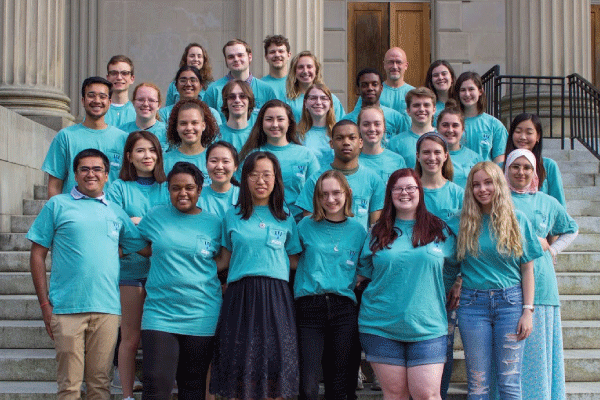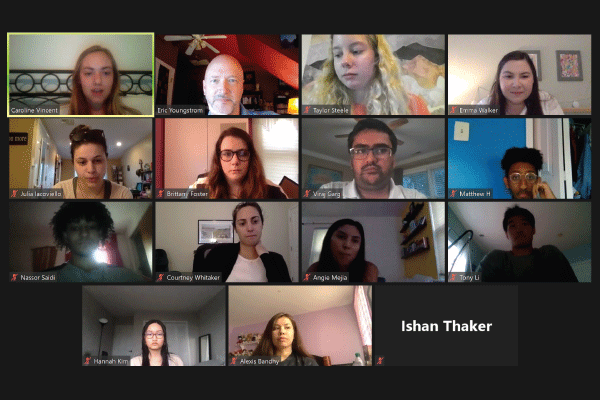Featured
COVID-19 Creates a Crisis—and an Opportunity to Give Away Psychological Science
Student-led organization uses crowdsourcing to improve the quality of psychology-related information online

The year 2020 has been one of remarkable upheaval, with forces reshaping economies, systems of care, and education, as well as our daily lives. The psychology community has quickly responded to these myriad challenges and changes, sharing resources, information, and support while also working rapidly to study the social impact of these shifts.
Helping Give Away Psychological Science (hgaps.org), a student organization founded in 2016 at the University of North Carolina (UNC) at Chapel Hill, has been steadily advancing its mission to help “the best information about psychological science reach the people who would benefit” by improving the quality of psychology-related information online. The group has focused primarily on Wikipedia and its sister site, Wikiversity, to achieve this. As the world’s fifth-most-visited site, Wikipedia can reach an audience far greater than even the most highly cited academic journal, and its content is free and more accessible to psychologists and allied professionals working in the community.
Updating Wikiversity as New Best Practices Emerged
When stay-at-home orders went into effect and campuses and workplaces were shuttered because of COVID-19, HGAPS members built on their past experience creating pages and infographics on Wikiversity to rapidly deploy resources during and after the California wildfires, multiple hurricanes, and the shooting at Marjory Stoneman Douglas High School. Students and faculty at UNC and other universities with active HGAPS chapters started meeting via Zoom to identify the psychology-related resources we could provide. We began by developing a page of resources centered on evidence-based principles and practices (e.g., getting enough sleep, exercising, practicing mindfulness) to help people cope with COVID-19 and other epidemics. We then created new pages on Wikiversity that targeted more specific needs, such as Telepsychology, which offers a comprehensive guide to providing psychological services virtually, and a companion page, Telepsychology Guide for Patients. One page we developed, about how people with bipolar disorder may be particularly affected by the stay-at-home orders and social distancing, is now under review for publication in the WikiJournal of Medicine.
Originally developed to help people share didactic information, including lectures, exercises, and technical articles, Wikiversity is well suited for sharing psychological science. Like Wikipedia, Wikiversity is free, with robust tools for version control, history, and discussion and well-developed metrics and tracking tools. A key benefit is that its editing community is more receptive to articles about the details of the science, including the psychometrics of assessment tools, reviews of primary research, and nuances about moderators and factors that might change findings. In contrast, Wikipedia pages, especially on topics that overlap with medicine or politics, attract editors whose content expertise is outside of psychology, which makes it harder to ensure the content hews closely to evidence-based guidelines. Wikipedia works hard to avoid bias in its content, and although this makes sense on its face, one consequence is that its editors tend not to consider peer-reviewed research studies as good sources because a single study could have a misleading result. Instead, Wikipedia editors favor systematic reviews and meta-analyses as sources of evidence. When an up-to-date review or meta-analysis is not available, the content on Wikipedia may be out-of-date.

Given the rapidly changing nature of the COVID-19 pandemic—as with other crises for which HGAPS has provided resources—being able to update pages to reflect current knowledge and best practices is crucial. Wikiversity enables this by allowing contrasting findings to be described and new results to be added almost in real time. For example, in the early days of the stay-at-home orders, we updated the HGAPS Telepsychology and Coping with Coronavirus pages more than once a day as we learned more about the specific challenges people were facing and worked to create and consolidate the most relevant resources. Because so many psychologists leapt into action to help others in the early phase of the pandemic, there was a wealth of information for us to collect and disseminate. We also have encouraged others to edit the pages themselves (anyone can edit Wikipedia or Wikiversity!) or to add contributions to an open Google Doc, from which future updates will be pulled.
Drawing From Collective Knowledge
HGAPS’s COVID-19 resources and other contributions are prime examples of how crowdsourcing can help our communities. HGAPS drew psychological science–based content from the collective knowledge of the psychologists and other experts in our network. Members then organized and edited the content so that it could easily benefit other psychologists, educators, and individuals affected by the pandemic and associated social policies. As of mid-August, the Telepsychology page had been viewed almost 20,000 times, and the Coping with Coronavirus page more than 10,000. The platform makes it possible to reach—and help—a lot of people.
Today, COVID-19 remains a hugely disruptive and damaging force, and as new challenges and resources are identified, HGAPS will continue to update (or develop) relevant pages. For example, we are now developing a page of resources to help students and faculty with the transition to socially distant campus life this fall. We have also turned our attention to new areas, including a page of resources to help address structural racism in mental health programs.
HGAPS is a student-led, 501(c)(3) organization aiming to build project-focused teams and new university-based chapters. Content experts are vital; sharing expertise and advising students working in their content areas creates partnerships that teach while reaching much larger audiences. (See a full list of HGAPS’s work to date at hgaps.org/impact-and-tools.html.) There are many ways to get involved, such as by sharing Creative Commons–licensed figures and handouts, building a team focused on a specific topic or page, starting your own chapter, or just providing helpful tidbits for an existing page. Contact us at bit.ly/HGAPSinterest with your interests and ideas.





APS regularly opens certain online articles for discussion on our website. Effective February 2021, you must be a logged-in APS member to post comments. By posting a comment, you agree to our Community Guidelines and the display of your profile information, including your name and affiliation. Any opinions, findings, conclusions, or recommendations present in article comments are those of the writers and do not necessarily reflect the views of APS or the article’s author. For more information, please see our Community Guidelines.
Please login with your APS account to comment.